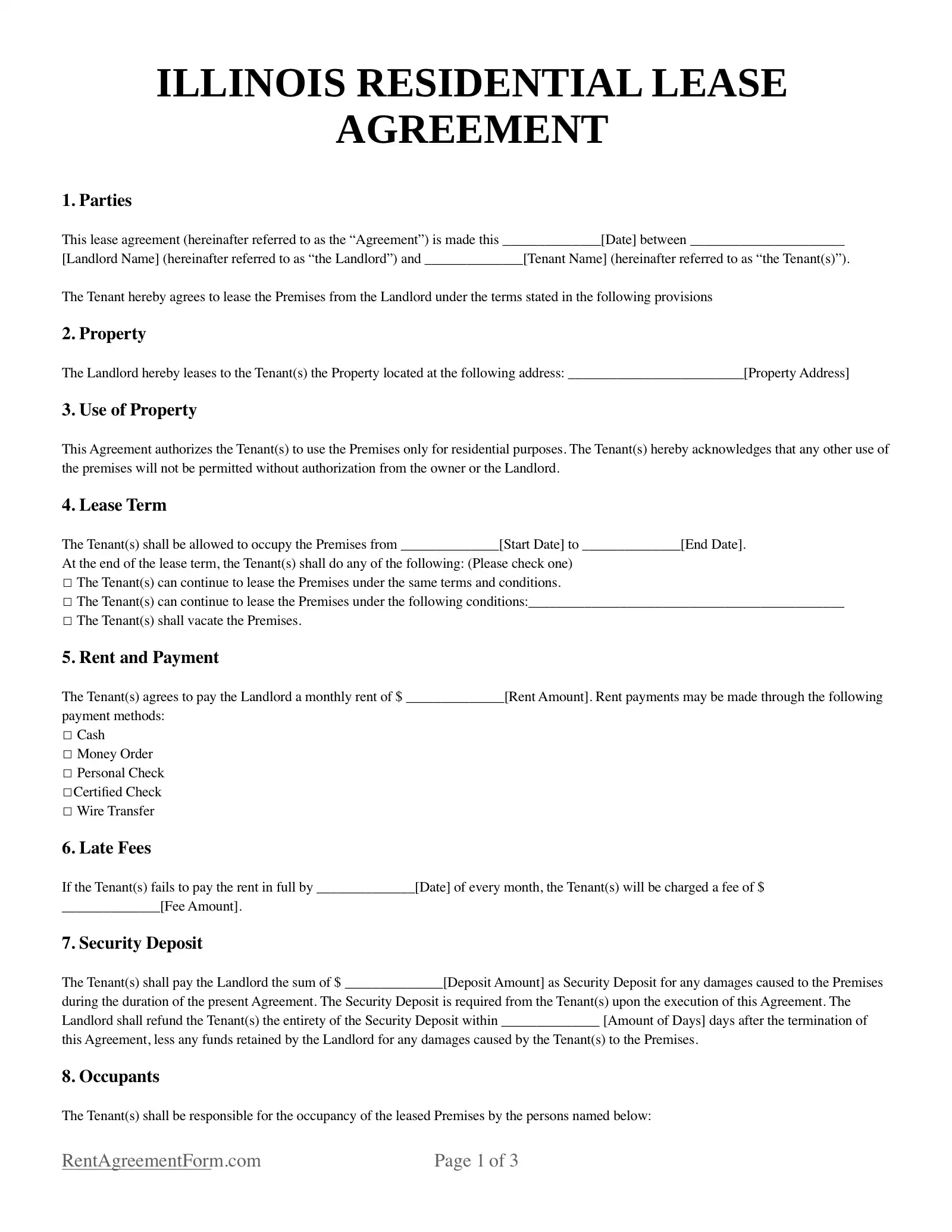Illinois Residential Lease Agreement Form
An Illinois Residential Lease Agreement Form is a legally binding document that outlines the lease agreement between a landlord and tenant. The contract details the terms and conditions of the lease, as well as the rights and obligations of each party involved in the agreement. This form is used when renting an apartment, house, condo, and other residential properties.
The term “lease agreement” is usually associated with tenancies that last for a longer period, usually six to 12 months. When referring to short-term tenancies, the form is called an Illinois Rental Application.
The standard template of an Illinois rental agreement form establishes the nature of the lease while stating the required details from each party. This includes contact information, property details, rent details, occupancy limits, rules and restrictions, and more.
If you need to draft an Illinois rental agreement, free printable forms are available for download online. They also specify the information that should be included in the contract. It is simple to understand and fillable by the landlord as well as the tenant.
Establishing a lease agreement with thorough and transparent details is imperative to ensure protection for all parties involved. It is also expected to fall within the confines of the Illinois laws on tenancy.

Required Disclosures in a Illinois Residential Lease Agreement
Before tenants sign the rental lease agreement, Illinois law requires landlords to provide potential them with information about the property. The necessary disclosures are listed below:
- Lead Disclosure Rule - Landlords renting out properties constructed before 1978 are required by law to inform tenants about the presence of lead paint in the apartment or building, the hazard of lead-based paints, and past reports of lead paint hazards that have been resolved (Lead-Based Paint Disclosure Rule (Section 1018 of Title X)).
- Rent Concession - According to the Rent Concession Act, any concession granted to the tenant must be mentioned in writing on the lease agreement form. If a landlord fails to do so, they may be charged with a Class A misdemeanor (765 ILCS 730/).
- Cost of Utility - If the landlord intends to split the cost of utilities with the tenant or hold the tenant responsible for paying utilities for any common area, this must be disclosed on the rental application form. They must specifically mention that such costs are separate from the rent paid by the tenant.
- Information on Radon - Landlords are required by Illinois law to disclose any cases (whether current or previous) of radon detection to potential and current tenants. The landlord must also provide tenants with a pamphlet about radon hazards approved by the state of Illinois. Tenants can also request tests for radon (420 ILCS 46/1).
- Disclosure of Smoke & CO Detectors - Illinois law also requires landlords to disclose in writing the testing and maintenance of smoke and carbon monoxide detectors (425 ILCS 60/1).
Rent Grace Period in Illinois
Illinois law does not require landlords to have a rent payment grace period. Rent paid any time after the due date is considered late and subject to a late fee. If landlords wish, they may include a rent grace period in the lease agreement. In most cases, the standard grace period is five days.
To make sure that tenants pay rent on time, the landlord must perform thorough tenant screening. They can also make the payment of rent easier by providing an option to pay online.
Security Deposit Laws
There is no statewide law in Illinois regarding the maximum security deposit amount that is to be charged to a tenant, but it’s better to check with city and county laws to know if such limits exist.
However, there is a law stating that in cases where landlords own properties with five or more units, the landlord must return the security deposit of the tenant within 30 to 45 days after the tenant has moved out (765 ILCS 710/1).
Helpful Resources
For more details on leasing residential properties in Illinois, you may refer to the following: